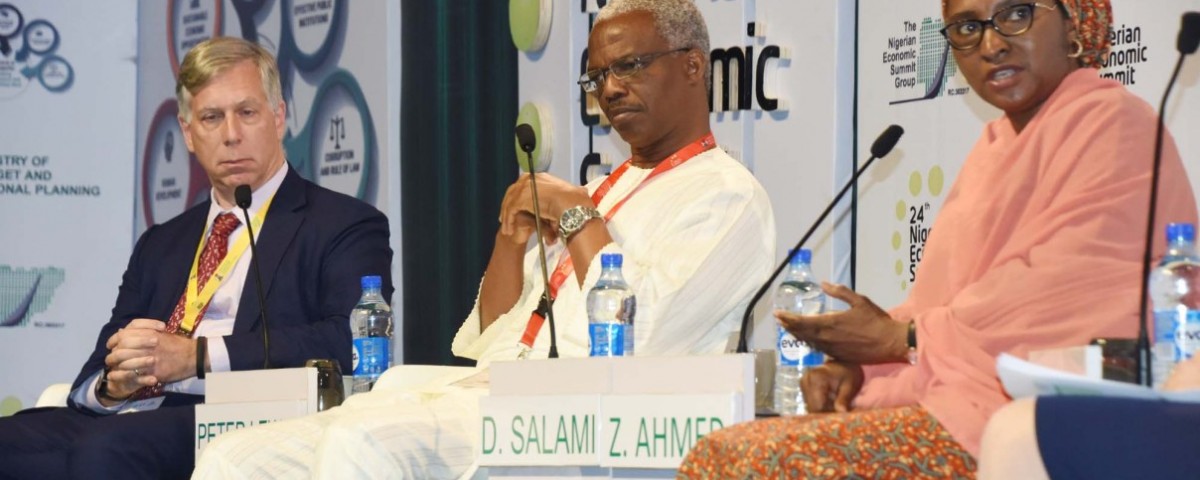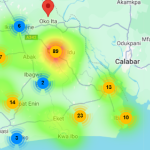The BusinessGreen Guide to the SDGs: SDG17 – Partnerships for the Goals
October 24, 2018IPDU Thematic Report on Human Trafficking in the Niger Delta
October 25, 2018PIND rolls out Good Governance Models at NESG
Pic.15. From left: Director of African Studies, Johns Hopkins University, Prof. Peter Lewis; a member of the Nigerian Economic Summit Group, Dr Doyin Salami; and Minister of Finance, Zainab Ahmed, during a session on Ending the Vicious Cycle, at the 24th Nigerian Economic Summit in Abuja on Tuesday (23/10/18). 05189/23/10/2018/Jones Bamidele/NAN
The Foundation for Partnership Initiatives in the Niger Delta, PIND, has introduced stakeholders from government agencies, civil society organisations, private sector and academia to new human capacity development models it has deployed successfully in the Niger Delta region.
This was done on Tuesday during a breakfast session at the 24th Nigerian Economic Summit held at Transcorp Hilton Hotel, Abuja.
Giving an expert insight, Dara Akala, PIND Executive Director, described the foundation’s approach as innovative and said its aim is to make people and communities more independent in how to represent their interests and achieve economic prosperity.
“To improve economic opportunities that can reduce poverty and enhance civil society participation,” he said, “a different approach is required to what has been deployed traditionally.
“Such a human capacity development approach should be sustainable and one that identifies, inspires and empowers individuals, organizations and systems within the productive sectors to make change happen on their own, and to cascade that change among their peers such that many more adopt it and spread its benefits system-wide.”
Ultimately, he said, individuals and communities empowered through the projects are able to perform their core functions efficiently and sustainably, and they develop over time such that they no longer depend on government support or donations.
ALSO READ: Cross River plans to tell African story positively with Africanism at 2018 Carnival Calabar
NNPC/Chevron Joint Venture expends over N20.6b on 600 projects in Niger Delta
“Such sustainable human capacity development goes beyond skills acquisition or development. It is an evidence-driven, not one-off, process that requires time, is systemic rather than individualistic and is a bouquet of mutually supporting interventions,” he added.
“This approach will ensure that economic gains occur in a systemic and an inclusive manner, which advances the population, especially youth and women and prevent a workforce and civil society that continues to experience joblessness and fails to advance aims targeted at strengthening institutions and tackling poverty.”
According to Mr Akala, the approach involves motivating individuals to try new things and work efficiently, facilitating the pursuit of new growth objectives and strategies, building expertise in technical and business skills to enable entrepreneurship and innovation, providing various resources to accelerate growth process, and linking to networks, markets and relevant information.
ALSO READ: PIND commits $190m to Niger Delta economic development and peace building
The foundation’s interventions, he noted, “are yielding good results in poverty reduction and wealth creation in the Niger Delta”. They have led to the emergence of business and aquaculture service providers who sell advisory services to farmers and MSMEs. He also said over 50,000 farmers and processors are increasing productivity and having higher yields from using improved agricultural practices introduced to them by PIND.
The session also featured group discussions on topics ranging from wealth creation to social services, conflict mitigation and job-readiness for the youth population. The discussants were PIND Executive Director; James Elekwachi, PIND Market Development Projects Manager; Bose Eitokpah, PIND Capacity Building Program Manager; and Nkasi Wodu, PIND Peace-building Program Manager.
Others included Emeka Ile, Project Manager for the Niger Delta Youth Employment Pathways (NDYEP) and Tunji Idowu, PIND Deputy Executive Director.
Culled from: Premium Times









